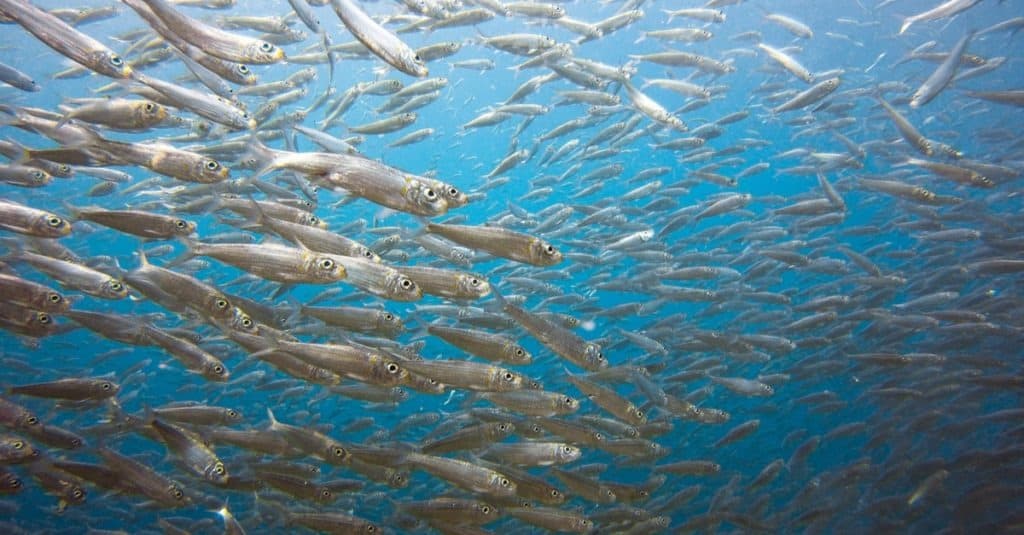Sardines are part of the herring fish family. They are a popular canned fish you can easily find in most supermarkets. Some people add them to crackers or in other recipes. It’s not uncommon for people to eat them straight out of the can. Even if you’re not a fan of eating fish like this, you may be trying to add fish to your dog’s diet. This is a great idea, but you may wonder if dogs can eat sardines. Yes, they can! Dogs can eat sardines.
When choosing them for your dog, there are some risks and things to watch out for which will make it safer for your pet. You’ll learn all about their benefits and how to feed them to your pup. Get ready to grab a can of dead fish and treat your doggie after reading this post!
Risk of Sardines

Care should be taken when feeding sardines to dogs as fish bones can cause a risk of choking
©Chendongshan/Shutterstock.com
Large or small dogs may choke on sardine bones found in larger fish. Before giving fresh sardines to your dog, look them over for larger bones and remove them. Although there is less risk with canned choices because they contain small sardines with soft bones, keep an eye on your dog for choking signs. All fish have some levels of mercury, although the dangers of mercury poisoning are minimal.
You can safely give little sardines to your dog in moderation because larger fish like mackerel often have far greater mercury levels than fish like sardines. Choose fresh sardines or canned in water instead of sardines canned in oils, and feed the fish to your pet in moderation to avoid unhealthy weight gain.
Too much sodium can cause several issues. For dogs with high blood pressure, it can elevate it more. They probably aren’t the best snack for overweight dogs who already consume a lot of fat or have sensitive stomachs. It’s advisable to avoid sardines altogether if your dog has a history of pancreatitis or is predisposed to pancreatic inflammation.
Can dogs eat raw sardines?
Sardines, including uncooked fish of any kind, should never be given to your dog. They can still digest the fish, but their bodies need more effort to digest and absorb the nutrients than when the fish is cooked. The main issue with raw sardines is that they might be infected with parasites and diseases that could make your dog sick. Thiaminase is another enzyme found in raw sardines. This enzyme causes your dog’s body to break down vitamin B1, which may result in a vitamin B1 shortage.
Benefits of Sardines

Sardines can be extremely beneficial to dogs in small quantities
©SaltedLife/Shutterstock.com
Sardines offer several benefits to dogs. Because sardines are a complete protein, they have every vital amino acid your dog’s body requires for good health. All bodily functions in your dog, including digestion and organ function, are supported by these nutrients. It is excellent for dogs of any age; you’ll see why in the next section.
Omega-3
In sardines, like, other fish, omega-3 is present. It can offer your dog numerous benefits. Some of the benefits are the skin and coat health of your pup. The fur gets softer, hydrates the skin from within, and is excellent for helping with dandruff issues in your pet.
Older dogs suffering from joint problems can get relief from this in their diet. Inflammation in the joints is a common source of discomfort, but feeding sardines can help alleviate that. They include a reasonable amount of calcium and phosphorus. These are essential to maintaining your dog’s skeletal health.
Cognitive Function and Heart Health
DHA is a specific kind of omega-3 found in sardines. For optimal brain and vision functioning, this fatty acid is needed. All dogs need DHA, but it’s especially crucial for growing puppies and older dogs. Adding DHA to your dog’s diet will help it mature gracefully and promote growth.
Ubiquinol is another essential component found in sardines (or coenzyme10). Although this antioxidant is found in many canine cell types, increasing its levels has been shown to benefit heart health. Adding this option is especially useful for pets who already suffer from a congenital disability.
How to feed them

Canned sardines are the most convenient option
©Switlana Sonyashna/Shutterstock.com
Sardines can be fed in several ways, but the can is the most convenient option. When choosing a can, it’s essential to make sure there are no added ingredients that can upset your dog’s stomach or have adverse effects.
Look for sardines that are canned in water with no added salt. If you can’t find them in water, then look for one with a healthy oil like olive. Sardines in oil will have a higher fat content. You should ensure your dog doesn’t have too much fat from other food sources when feeding them.
How much to feed them
How often and the amount you feed your dog will depend on your dog. There is mixed information on exactly how much you can give them. A good rule is that ten percent of their diet can include treats, so sardines shouldn’t exceed that limit.
This chart will show how much a dog can split throughout the week. Some dog owners feed sardines daily, and others do it a few times a week. It’s best to start slow when you add anything new to their diet and watch for any signs of trouble. Although it’s rare, some dogs can have an allergic reaction and show symptoms such as swelling, itchiness, and difficulty breathing.
| Weight | Number of Sardines |
|---|---|
| Under 5 lbs. | 2 |
| 6 to 15 lbs. | 4 |
| 16 to 25 lbs | 5 |
| 26 to 50 lbs | 8 |
| Over 50 lbs | 14 |
Conclusion
Sardines are a great way to treat your pup. They offer several benefits because of their omega 3 content. This can make their fur come to life, improve skin conditions and even provide pain relief for dogs with joint issues.
It’s a healthy treat that is great for heart and brain health. While there are some mild risks with giving dogs sardines, buying the canned ones packaged in water will decrease several of the risk factors. Depending on the size of your dog, one can of sardines may go a long way.
Make sure you don’t overfeed them because it can cause weight gain. Avoid altogether if your dog has a history of pancreatitis. Get a can, show your dog you love them, and check out our other posts about what dogs can eat!
Bonus: Boiled Eggs Are Another Healthy Option for Dogs

Hard-boiled, non-salted eggs are a perfect healthy snack for dogs.
©Evtushkova Olga/Shutterstock.com
If you don’t like fish you can boil a few eggs and keep them on hand in the refrigerator for a nutritious, healthy snack for your dog. Hard-boiled eggs without salt may be the perfect solution to providing your dog with an all-natural, highly nutritious treat. Eggs are an excellent source of fatty acids, vitamins, minerals, and protein – plus they are easy on the stomach unless your dog is allergic.
It may seem that raw eggs may be a great way to provide your dog with health benefits – by mixing them into food – but that is not the case. Raw eggs are no more nutritious than cooked eggs and there is a risk of salmonella infection that could cause vomiting and diarrhea. Just play it safe and boil eggs for your pup – they love it!
The photo featured at the top of this post is © Chendongshan/Shutterstock.com
Ready to discover the top 10 cutest dog breeds in the entire world?
How about the fastest dogs, the largest dogs and those that are -- quite frankly -- just the kindest dogs on the planet? Each day, AZ Animals sends out lists just like this to our thousands of email subscribers. And the best part? It's FREE. Join today by entering your email below.
Sources
- The Farmers Dog, Available here: https://www.thefarmersdog.com/digest/sardines-for-dogs/
- What Can My Dog Eat, Available here: https://whatcanmydogeat.com/can-dogs-eat-sardines/
- Dogster Magazine, Available here: https://www.dogster.com/dog-food/sardines-for-dogs
- Iceland Pure, Available here: https://icelandpure.com/can-dogs-eat-sardines/
Thank you for reading! Have some feedback for us? Contact the AZ Animals editorial team.






